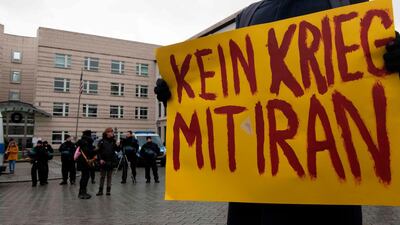Germany, Slovakia and Croatia are to temporarily move some of their troops stationed in Iraq to neighbouring Jordan and Kuwait, as tensions between the US and Iran escalate.
The killing of Iranian commander Qassem Suliemani last Friday in Baghdad has drastically heightened a crisis between Washington and Tehran.
German will pull out 30 or their 120 forces stationed across Iraq. About 90 of their soldiers are based in northern Kurdish region.
In a letter to parliament, the German government said 30 troops who trained with Iraqi security forces would be sent to Jordan or Kuwait.
“Our paramount interest is that Iraq’s stability and unity do not fall prey to the latest escalation. Our main priority remains our soldiers’ safety,” German foreign minister Heiko Maas said.
Berlin has about 400 troops in the region as whole as part of the coalition fighting against ISIS.
Both Slovakia and Croatia have also announced that they will temporary withdraw troops from Iraq.
Slovakia's prime minister's office announced it has moved "seven service members from Iraq to an unspecified location".
They have been in Iraq as part of a Nato training mission.
Prime Minister Peter Pellegrini said on Tuesday he "will consult with Nato allies on further steps".
Croatia said it will withdraw 14 of its forces from Iraq to Kuwait, according to a decision made by the Nato Alliance.
"We are monitoring the security situation with the allies and appropriate decisions will be made in co-ordination with the allies. We emphasise that the security of Croatian soldiers is paramount," the Croatian ministry of defence said.
The decisions come after the Iraqi parliament voted on Sunday to expel all foreign troops from the country after the killing of Suleimani.
“Following the resolution by the Iraqi parliament, we will speak immediately with the Iraqi government in order to clarify how it wants to shape future relations,” Mr Maas said.
He confirmed his country was "willing to continue providing support if so wished and if circumstances permit".
Roderich Kiesewetter, a politician with Chancellor Angela Merkel’s party who is on the German parliament’s foreign affairs committee, said the “temporary reduction” would mean “about 30 soldiers will be pulled out of Taji and a few out of Baghdad".
“Our soldiers are staying in the region and the mission is being kept in place for now, even though it is suspended this week pending further consultation,” Mr Kiesewetter told Deutschlandfunk radio.
The drawdown of German troops was ordered by the US-led joint command for fighting ISIS, the government said.
German troops could be moved back to Iraq if their training mission resumes.
Mr Maas said the German military presence in Iraq had been at the invitation of the Iraqi government and parliament.
"If that is no longer the case … then the legal basis for us to be there is missing. We have to clarify this with those responsible in Baghdad as soon as possible,” he said.
He also warned the fight against ISIS was not over, saying the group remained a "serious threat".
On Sunday, Ms Merkel issued in a joint statement with France's President Emmanuel Macron and UK Prime Minister Boris Johnson in which they urged Iraq not to jeopardise the battle against ISIS.
"Preserving the coalition is of great importance in this context. We call on the Iraqi authorities to continue to provide the coalition with the necessary support," the statement said.


